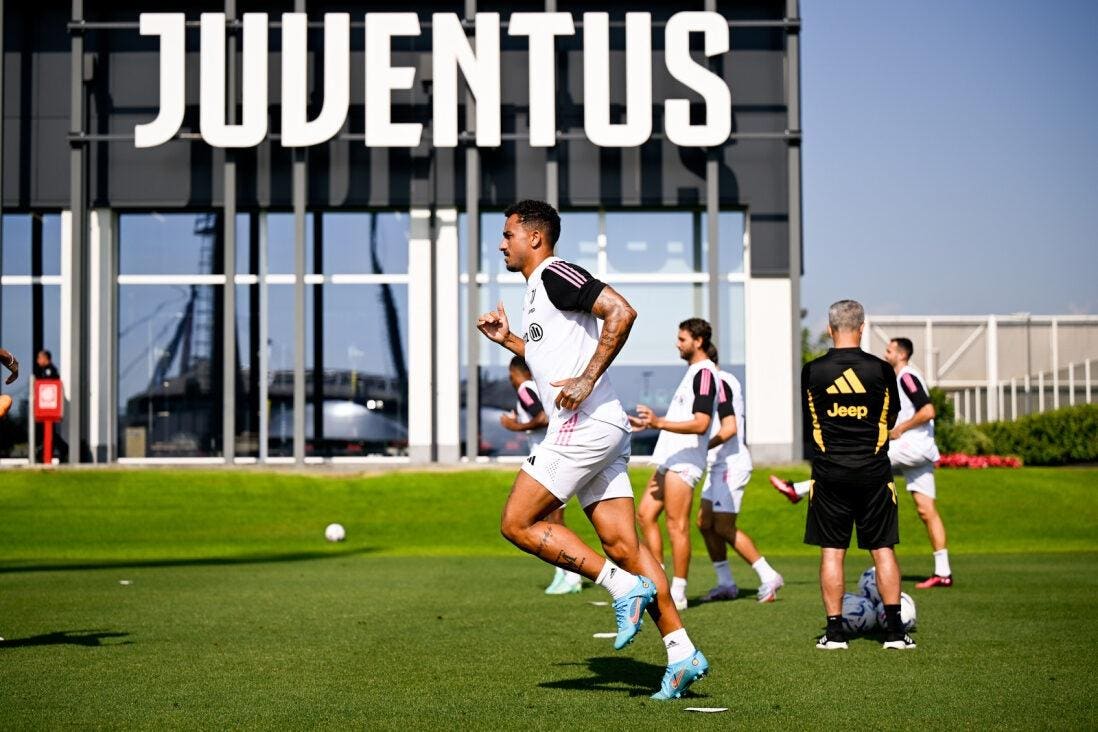
Serie A side Juventus have been experimenting with an innovative method that leverages brain power to address some of the players’ major challenges in modern soccer, including returning to play following long-term injuries and boosting athletic performance.
This approach, which aims to expedite the athletes’ recovery process as well as improve their output on the pitch, involves zero physical effort and lots of fun brain games.
“Imagine being able to play a video game using only the power of thought and, thanks to it, train your ability to focus, thus enhancing sports performance,” Carolina Chiappero, head of innovation at Juventus, said during our interview from last week.
With iBrain-Tech virtual games, soccer players control an avatar’s movements on the screen … [+]
The concept behind this vision is to have soccer players live and perform game-like actions without having to actually lift a single muscle in their body, thus averting the risk of incurring soft-tissue injuries.
As they sit on a chair and look at the television or computer screen, a helmet full of wires is strapped around their head. From that sitting position, with the power of their brain, they control an avatar that replicates the physical movements they would normally perform during a soccer match, such as passing, shooting and jumping.
To put it another way, they engage in virtual soccer games and training sessions while exerting exclusively mental effort.
TURIN, ITALY – JUNE 18: Carolina Chiappero attends Juventus Academy World Cup 2022 Awards Ceremony … [+]
Konstantin Sonkin, the Israeli neuroscientist behind this software called i-BrainTech, stressed on the numerous benefits that this approach can have on athletes, especially when they have been forced to sit out from games for extended periods of time.
“In the realm of long-term injuries, there’s often a decline in motor skills, coordination, and focus post-rehab due to weakened mind-muscle connections and the degradation of neuromuscular pathways,” said Sonkin during the joint interview.
“I-BrainTech’s training addresses this challenge by allowing injured players to engage in numerous repetitions of soccer-specific drills without imposing physical strain. This strengthens neuromuscular pathways, preserves motor skills and boosts confidence for a successful return to pre-injury levels.”
Sonkin explained that iBrain Tech and Juventus are currently in what is defined as the “proof of concept” stage, an initial phase in which the software addresses the needs of Juventus’s injured players and their recovery process. If the technology achieves the desired results, the plan is to extend its application to include the academy teams and, eventually, use the device for broader purposes, such as serving as a means for talent identification at the club.
ORLANDO, FLORIDA – JULY 31: Duccio Ferrari Bravo of Juventus during a training session on July 31, … [+]
Duccio Ferrari Bravo, head of sport science and R&D at Juventus, sounded very enthusiastic about the technology despite acknowledging that there’s still a long way to go.
“The most impressive aspect of i-BrainTech is that it is a video game controlled exclusively by brain impulses, without any movement on the part of the player, focusing all attention on the mental process underlying the motor task while at the same time being very engaging for those using it,” he said when asked to comment on the method.
In undertaking this project, Juventus primarily aim to substantiate iBrain Tech’s efficacy in enhancing the injured players’ recovery process and elevating their athletic output on the field. Unleashing this kind of potential could shape the way players and staff members like Ferrari Bravo approach their daily practice sessions at Juventus.
“This proof of concept was born with the need to take a shared path to validate the effectiveness of this type of training in terms of performance improvement and return to play,” he added.
“This is a preliminary phase in which we are testing the device with several technicians and athletes. Cognitive training is, in fact, a new frontier to explore with regards to improving performance in sport at all levels.”
VINOVO, ITALY – SEPTEMBER 13: Juventus players during a Juventus Women U19 Training Session at … [+]
Professional soccer clubs in Europe have previously tried out brain games, including English Premier League giants Liverpool FC. In the United States, several sports leagues have invested in these types of technologies, with MLS club Atlanta United FC being the first to give i-BrainTech a shot.
Carolina Chiappero, who has been in charge of Juventus’s innovation strategy since October 2022, explained that the Turin-based club has over the last year ramped up its involvement in this field. Her department, she concluded, is always in search of cutting-edge technologies that can step up the way of doing things at what remains Italy’s most valuable and successful soccer club.
“Juventus have, among their main objectives, that of translating innovative ideas into tangible value,” Chiappero said.
“In the sports industry, this means identifying innovative technologies that can contribute to improving the performance of our players at all levels.”
.